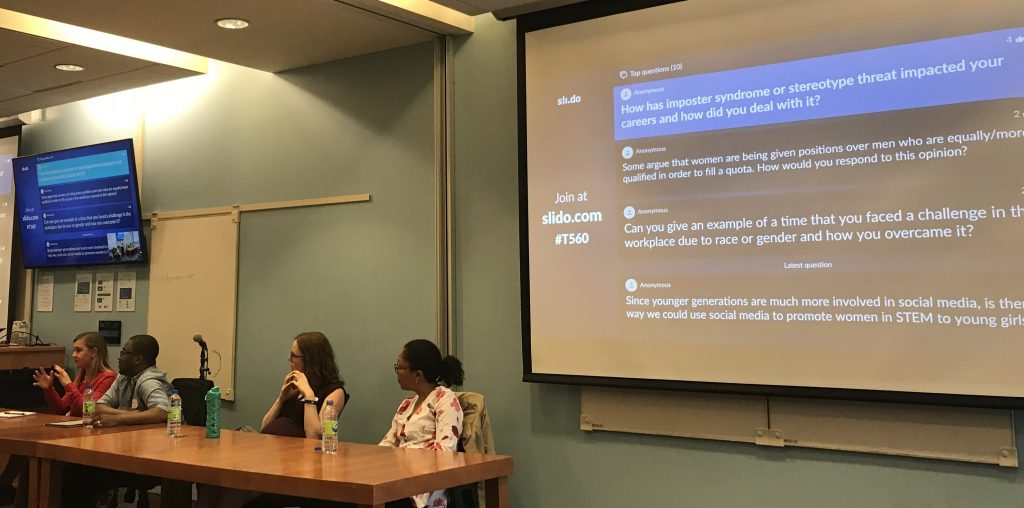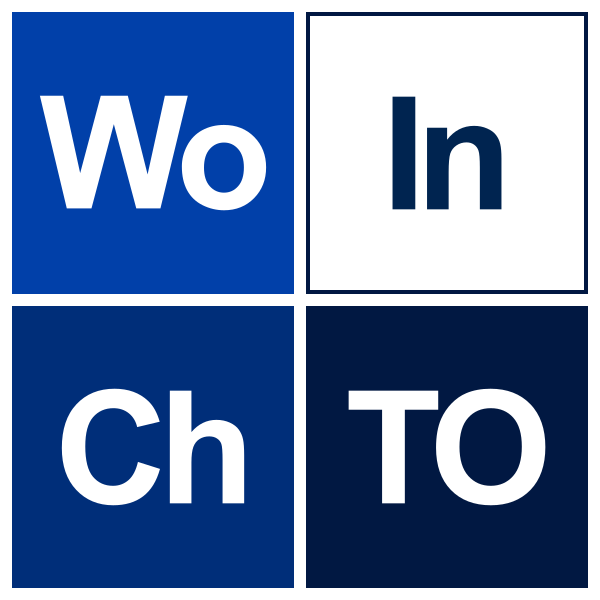Unseen Obstacles to a Science Career: Panel 2018 Recap

To conclude the academic year, WICTO hosted a panel “Unseen Obstacles to a Science Career,” which was open to the entire University of Toronto STEM community. Four outstanding panelists were invited to provide their unique insights to the discussion about the unforeseen challenges when pursuing a career in STEM. Our esteemed guests were Dr. Emily Agard (Director of SciXchange at Ryerson University), Prof. Sophie Rousseaux (Assistant Professor at the Department of Chemistry, UofT), Prof. Ismael Mourifié (Assistant Professor at the Department of Economics, UofT), and Fiona Logue (Marketing and Business Intelligence Analyst at L.V. Lomas).
Unseen Obstacles
The discussion began right off the bat when Nimrat Obhi (WICTO’s Seminar Series Coordinator and panel moderator) asked the panelists “what has been the largest unseen obstacle in your career, and how did you overcome this?” Logue indicated that her biggest obstacle was that she had to learn to self-advocate. Logue transitioned from working in analytical and materials chemistry fields during her undergraduate degree to working in technical marketing at LV Lomas. In order to transition and hold the current role of Marketing and Business Intelligence Analyst, Logue asserted her impact for various projects to upper management. By asking herself “what am I proud of”, she was able to provide concrete examples to showcase her work.
For Agard, developing self-trust was her most unseen obstacle. After receiving her PhD in Immunology from the University of Toronto, Agard taught biology at York University and the University of Toronto at Scarborough, in addition to conducting research in a laboratory and finding time to do community outreach events. She then joined Ryerson University as an Assistant Professor where she taught various courses all while continuing her work in public engagement. Her commitment to making science accessible, engaging, and inclusive for all groups eventually led her to taking on the role as the Director of SciXchange. This position allows her to continue teaching at Ryerson while making science engaging, comprehensible, and accessible to the general public. Throughout this time, Agard had to trust herself that if she worked hard, eventually everything will align into place.
Rousseaux shared with the group that during her PhD her supervisor passed-away. Not only did she lose a mentor, but she also lost the traditional network a graduate student has when beginning their job search. She overcame this through persistence: first by completing her graduate research under Prof. Stephen L. Buchwald, and then moving to the UK to do postdoctoral studies with Prof. Harry L. Anderson. These experiences allowed her to create her own network before joining the Department of Chemistry at the University of Toronto.
As for Mourifié, his biggest obstacle was not unseen. He would usually be the only person of colour in the room. Mourifié and his fellow peers of colour thought economics was not the appropriate career path as they went through the academic pipeline. They felt like they did not belong since there was an increase of race disparity. However, Mourifié said that in these situations “you need to keep going and do what you like.” By having this type of mentality, you will ultimately be a very successful person.
Role Models
Mourifié’s story inspired the next topic of discussion: role models. Various studies have shown role models are important for the retention of minorities in STEM. Unfortunately, role models are not always present in particular fields. As Mourifié said, “sometime you need to be the first role model to create opportunity for the future generation.” Rousseaux also pointed out that graduate students have ample opportunity to be role models in the science community by participating in events, such as Science Rendezvous and Chemistry Olympiad.
Diversity and Inclusivity
As more diverse role models are present in the STEM fields, we need to make sure that the workplaces are also inclusive. Agard reminded us that it is important to distinguish between “diversity” and “inclusivity”. Many places are checking off boxes to show their workplace is diverse, however this strategy does not guarantee that all voices are heard. Workplaces have to ensure that not only do different people sit at the table, but that all of these people are also included. When joining a workplace, you want to make sure that you have supportive colleagues. As Logue indicated, during the interview process it is important that you ask about the work culture to make sure you fit.
On the topic of diversity in the workplace, the panel discussed how women and minorities can unfortunately view themselves as tokens for companies to reach a quota. This can ultimately deter women from pursuing STEM fields because they do not feel valued, as suggested by Mourifié. However, when you have an applicant that is a minority with an identical CV to that of the typical applicant, the minority person may be more qualified for the position by having more difficult life experiences. This person had to overcome more adversity and work harder in order to have the same experiences as the typical applicant. Rousseaux says to make sure you do not fall into the rabbit hole of “you were only hired for filling a quota”, you need to build up enough self confidence so you don’t believe these comments and take the opportunity to educate people who are making the comments.
Graduate Student Life and Mental Health
During the panel, graduate student life and mental health was also discussed. For graduate students, there is an unwritten social pressure that you should be working hard all the time. Rousseaux says that this is a challenge all academics should re-evaluate. People who are organized and work decent hours can get amazing results. As Logue pointed out, you need to manage energy and not time. Overall, academia is not preparing students for workplaces. Students are expected to work overtime repetitively which in the end causes them to have poor time-management skills. This constant stress is not helpful and can contribute to grad students’ overall mental health. It was evident from the panel that conversations about work hours and mental health issues need to happen in order to improve graduate student success.
Next Generation’s Biggest Obstacle
Many of the attendees also wanted to know from the panelists “what is the biggest obstacle that the younger generation will be facing.” They all agreed that technology will be the biggest obstacle because of how quickly it changes and that you have to be adaptable. Logue gave the example of how large companies, like Walmart, have to adapt to the technology or else they might perish.
WICTO would like to thank Dr. Emily Agard, Prof. Sophie Rousseaux, Prof. Ismael Mourifié, and Fiona Logue for sharing their unique stories. If you would like to find out more about the discussion during the panel, you can catch up on our twitter account.
